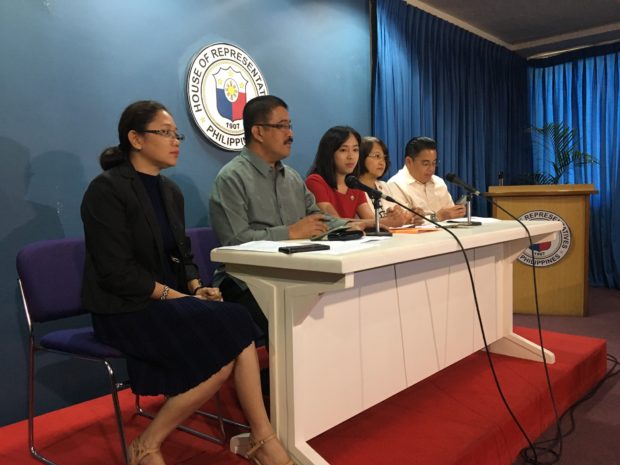New law providing reparations for Marcos-era martial law victims sought

In this file photo, Reps. Arlene Brosas, Carlos Isagani Zarate, Sarah Jane Elago, France Castro and Ariel Casilao face the media in Makabayan bloc’s regular press briefing. INQUIRER file photo
MANILA, Philippines — A new bill seeking to provide reparation and recognition for human-rights violations victims (HRVVs) during the martial law regime of former president Ferdinand Marcos Sr. has been filed in the House of Representatives.
Lawmakers from the Makabayan bloc — Gabriela Rep. Arlene Brosas, Kabataan Rep. Raoul Manuel, and Alliance of Concerned Teachers Rep. France Castro — said they filed House Bill No. 3505 on Thursday to recognize martial law victims not included in other programs.
Makabayan specifically talked about alleged HRVVs not claiming reparations under RA 10368 or HA 1304 because they failed to provide sufficient evidence.
“Many of those who were disqualified or denied were disqualified on the basis of technicality such as failure to promptly present evidence or testimony or submit duly notarized affidavits; failure to reply or understand notices, rules and regulations, deadlines of submission; and other problems encountered by ordinary people not familiar with legal procedures,” Makabayan reasoned out in the bill’s explanatory note.
“More and more relatives of martial law human rights violations victims have brought up their case on what they call an ‘unjust’ denial of their claims for reparation. Included among the claims denied by HRVCB were those from Hawaii class suit plaintiffs,” they added.
Article continues after this advertisementHuge step
A monetary award could not alleviate the suffering endured by many people during the regime of Marcos Sr. – the father of incumbent President Ferdinand Marcos Jr. -, the lawmakers said.
Article continues after this advertisementHowever, recognizing the martial law abuses that happened is a huge step for most of them.
“While no amount of monetary reparation will restore lost lives, properties, broken relations, and dreams of the human rights violations’ victims and their families, the reparation is important for them, as it forms part of the overall recognition of the reality of human rights violations and their immeasurable suffering of the people under the Marcos regime,” they explained.
“It is thus a matter of justice that the recognition and reparation for martial law human rights violations victims and their families continue through a new law providing for reparation and recognition of victims of human rights violations during the Marcos regime,” they added.
READ: Rosales: US lawyer who helped martial law victims deserves payment
If the bill is enacted and implemented, a Human Rights Violation Victims’ Recognition and Reparation Board would be established to validate and determine the HRVV claims for compensation.
The board shall be composed of eight members, headed by a chairperson appointed by the President from among nominees of the CHR and other human rights organizations.
A point system with a range of one to 10 points would be followed, wherein those getting 10 points would get the highest amount and one point with the lowest amount. The point system is classified into the following:
- Relatives of victims who either disappeared or died would get 10 points
- Victims who were tortured or sexually abused would be given six to nine points
- Victims who were detained would be given three to five points
- Victims of force or intimidation that led to voluntary exile, victims of an unjust confiscation of a business and other violations of law would be given one to two points
Non-monetary reparation may also be given to the families of HRVVs, like in the case of health and education services that the State can offer.
A P10-billion fund would be set aside for the reparation, which would come from Marcos’ ill-gotten wealth remitted by the Presidential Commission on Good Government. Meanwhile, the non-monetary reparation would be sourced from the budget of the concerned agency under the annual General Appropriations Act (GAA).
As early as 2019, several people who claimed that they were part of HRVVs during the martial law period stood against the American lawyer Robert Swift, who was behind the victorious class suit filed against the Marcoses in the Hawaii Court.
In a meeting with Swift at the University of the Philippines-Diliman’s Bocobo Hall, some victims said they had not received compensation for years after applying for reparation.
Swift’s legal victories helped release grants from the Marcoses’ ill-gotten wealth. Three tranches from the sale of Imelda Marcos’s paintings have also been released.
READ: Over 30 years after Marcos’ ouster, human rights victims still waiting for compensation | Marcos victims get P77,500 each amid objection from gov’t
Some victims claimed Swift shamed them for not being able to present credible evidence. Nonetheless, former Commission on Human Rights head Etta Rosales said Swift deserved a fair payment for his efforts since 1986.